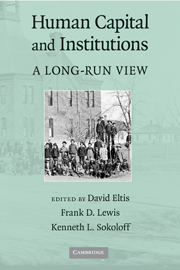Introduction
Published online by Cambridge University Press: 22 December 2009
Summary
Stanley Engerman and Kenneth Sokoloff have been leaders in renewing interest in institutions and their impact on economic development. The papers in this volume are concerned with human capital in its many dimensions, and bring to fore the role of political, social, and economic institutions in human capital formation and economic growth. The papers address a broad range of issues, from nutrition in pre-modern societies to twentieth-century advances in medical care, from the institutions that concerned workers in the middle and lower ranges of the wage scale to the factors that affected the performance of those who reached the pinnacle in business and art, and from political systems that stifled the advance of literacy to those that promoted public and higher education. Just as human capital has been a key to economic growth, so has the emergence of appropriate institutions been a key to human capital formation. It is this theme that underlies the papers in this volume.
Along with Stan Engerman, Robert Fogel pioneered the use of anthropometric evidence to study economic growth, and helped expand our view of human capital. Formal schooling, apprenticeship programs, specialized job training in the workplace, and learning-by-doing all raise productivity, but other forms of human capital investment are also important. The notion that health and physical size and strength can affect labor productivity is not new, but Fogel has brought these forms of human capital to center stage.
- Type
- Chapter
- Information
- Human Capital and InstitutionsA Long-Run View, pp. 1 - 8Publisher: Cambridge University PressPrint publication year: 2009
- 1
- Cited by



